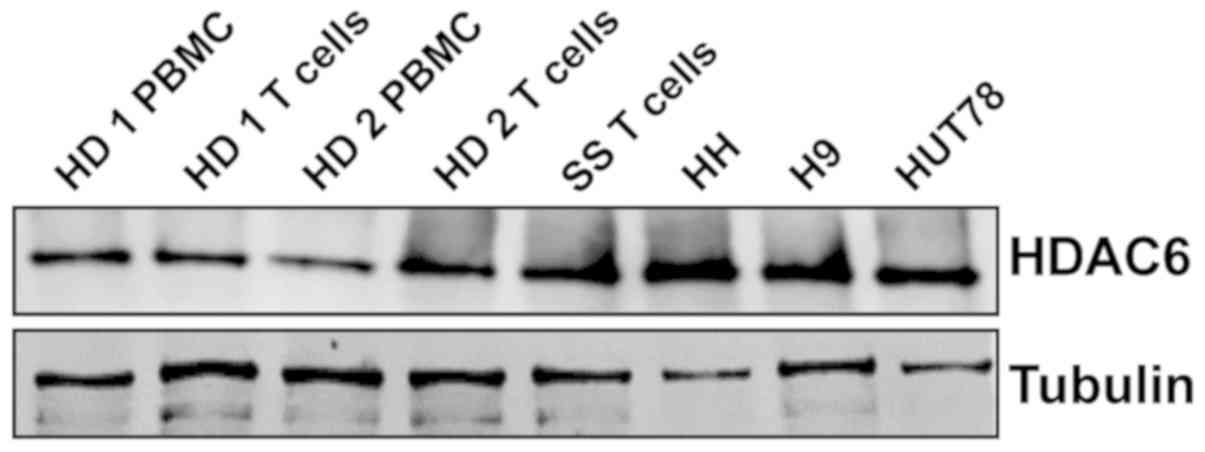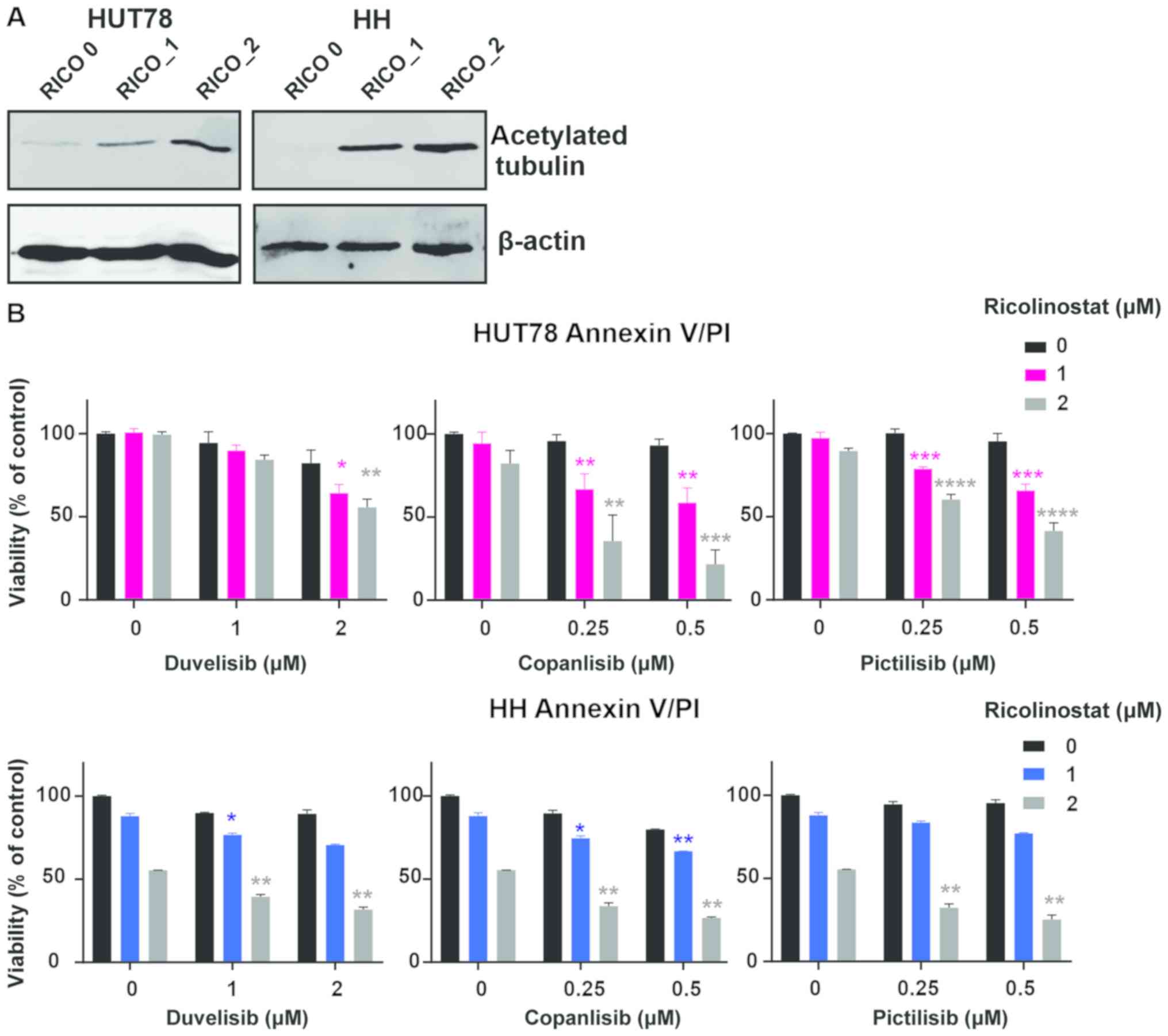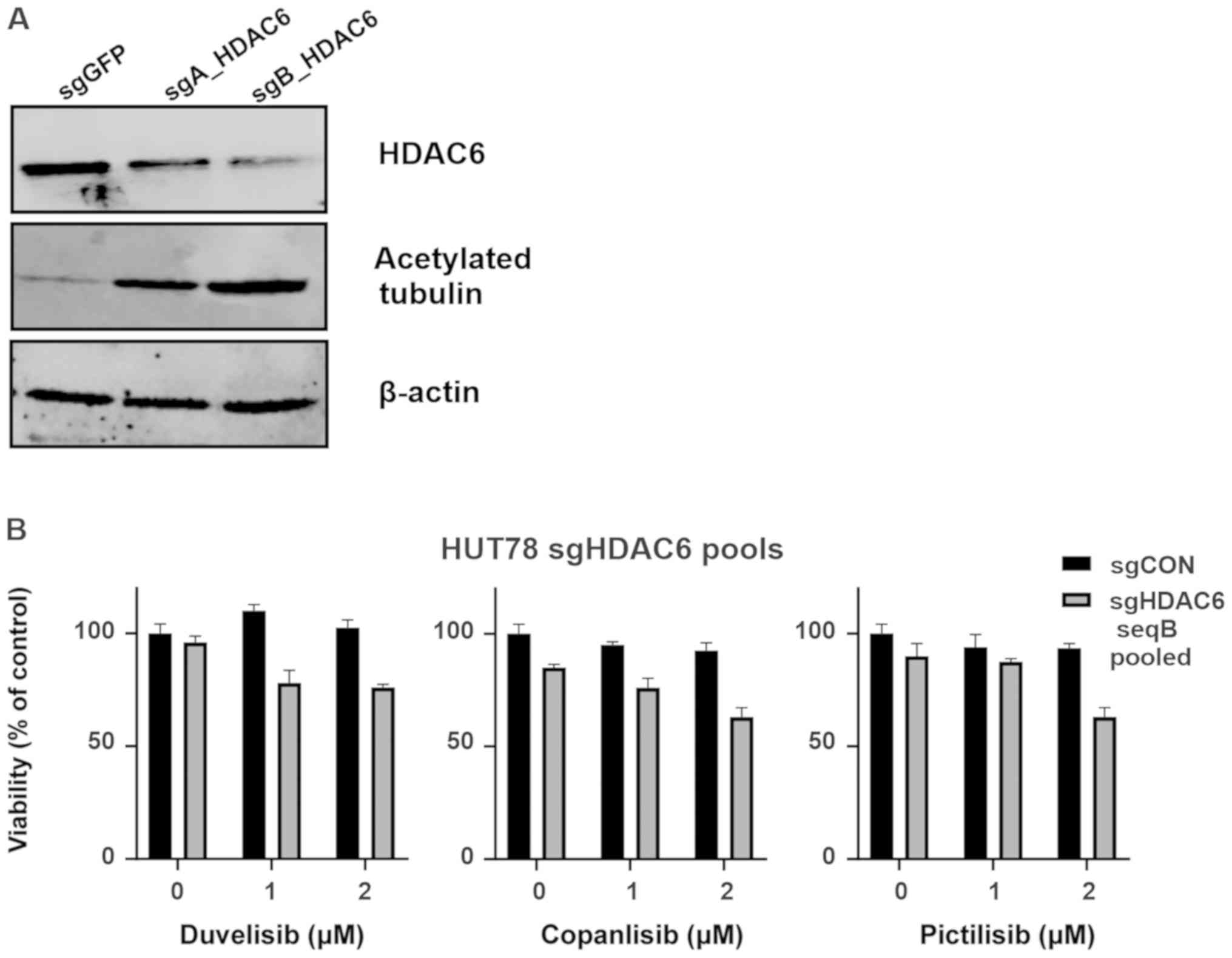|
1
|
Mangold AR, Thompson AK, Davis MD, Saulite
I, Cozzio A, Guenova E, Hodak E, Amitay-Laish I, Pujol RM,
Pittelkow MR and Gniadecki R: Early clinical manifestations of
Sezary syndrome: A multicenter retrospective cohort study. J Am
Acad Dermatol. 77:719–727. 2017. View Article : Google Scholar : PubMed/NCBI
|
|
2
|
Janiga J, Kentley J, Nabhan C and Abdulla
F: Current systemic therapeutic options for advanced mycosis
fungoides and Sezary syndrome. Leuk Lymphoma. 59:562–577. 2018.
View Article : Google Scholar : PubMed/NCBI
|
|
3
|
Guenova E, Hoetzenecker W, Rozati S,
Levesque MP, Dummer R and Cozzio A: Novel therapies for cutaneous
T-cell lymphoma: What does the future hold? Expert Opin Investig
Drugs. 23:457–467. 2014. View Article : Google Scholar : PubMed/NCBI
|
|
4
|
Saulite I, Hoetzenecker W, Weidinger S,
Cozzio A, Guenova E and Wehkamp U: Sezary syndrome and atopic
dermatitis: Comparison of immunological aspects and targets. Biomed
Res Int. 2016:97175302016. View Article : Google Scholar : PubMed/NCBI
|
|
5
|
Moskowitz AJ and Horwitz SM: Targeting
histone deacetylases in T-cell lymphoma. Leuk Lymphoma.
58:1306–1319. 2017. View Article : Google Scholar : PubMed/NCBI
|
|
6
|
Quaglino P, Maule M, Prince HM, Porcu P,
Horwitz S, Duvic M, Talpur R, Vermeer M, Bagot M, Guitart J, et al:
Global patterns of care in advanced stage mycosis fungoides/Sezary
syndrome: A multicenter retrospective follow-up study from the
cutaneous lymphoma international consortium. Ann Oncol. 30:4942019.
View Article : Google Scholar : PubMed/NCBI
|
|
7
|
Wilcox RA: Cutaneous T-cell lymphoma: 2017
update on diagnosis, risk-stratification, and management. Am J
Hematol. 92:1085–1102. 2017. View Article : Google Scholar : PubMed/NCBI
|
|
8
|
West AC and Johnstone RW: New and emerging
HDAC inhibitors for cancer treatment. J Clin Invest. 124:30–39.
2014. View
Article : Google Scholar : PubMed/NCBI
|
|
9
|
Marquard L, Gjerdrum LM, Christensen IJ,
Jensen PB, Sehested M and Ralfkiaer E: Prognostic significance of
the therapeutic targets histone deacetylase 1, 2, 6 and acetylated
histone H4 in cutaneous T-cell lymphoma. Histopathology.
53:267–277. 2008. View Article : Google Scholar : PubMed/NCBI
|
|
10
|
Mishra A, La Perle K, Kwiatkowski S,
Sullivan LA, Sams GH, Johns J, Curphey DP, Wen J, McConnell K, Qi
J, et al: Mechanism, consequences, and therapeutic targeting of
abnormal IL15 signaling in cutaneous T-cell lymphoma. Cancer
Discov. 6:986–1005. 2016. View Article : Google Scholar : PubMed/NCBI
|
|
11
|
Amengual JE, Prabhu SA, Lombardo M, Zullo
K, Johannet PM, Gonzalez Y, Scotto L, Serrano XJ, Wei Y, Duong J,
et al: Mechanisms of acquired drug resistance to the HDAC6
selective inhibitor ricolinostat reveals rational drug-drug
combination with ibrutinib. Clin Cancer Res. 23:3084–3096. 2017.
View Article : Google Scholar : PubMed/NCBI
|
|
12
|
Horwitz SM, Koch R, Porcu P, Oki Y,
Moskowitz A, Perez M, Myskowski P, Officer A, Jaffe JD, Morrow SN,
et al: Activity of the PI3K-δ, γ inhibitor duvelisib in a phase 1
trial and preclinical models of T-cell lymphoma. Blood.
131:888–898. 2018. View Article : Google Scholar : PubMed/NCBI
|
|
13
|
Vanhaesebroeck B, Guillermet-Guibert J,
Graupera M and Bilanges B: The emerging mechanisms of
isoform-specific PI3K signalling. Nat Rev Mol Cell Biol.
11:329–341. 2010. View
Article : Google Scholar : PubMed/NCBI
|
|
14
|
Kaneda MM, Messer KS, Ralainirina N, Li H,
Leem CJ, Gorjestani S, Woo G, Nguyen AV, Figueiredo CC, Foubert P,
et al: PI3Kγ is a molecular switch that controls immune
suppression. Nature. 539:437–442. 2016. View Article : Google Scholar : PubMed/NCBI
|
|
15
|
Balakrishnan K, Peluso M, Fu M, Rosin NY,
Burger JA, Wierda WG, Keating MJ, Faia K, O'Brien S, Kutok JL and
Gandhi V: The phosphoinositide-3-kinase (PI3K)-delta and gamma
inhibitor, IPI-145 (Duvelisib), overcomes signals from the
PI3K/AKT/S6 pathway and promotes apoptosis in CLL. Leukemia.
29:1811–1822. 2015. View Article : Google Scholar : PubMed/NCBI
|
|
16
|
Flinn IW, Hillmen P, Montillo M, Nagy Z,
Illes A, Etienne G, Delgado J, Kuss BJ, Tam CS, Gasztonyi Z, et al:
The phase 3 DUO trial: Duvelisib vs ofatumumab in relapsed and
refractory CLL/SLL. Blood. 132:2446–2455. 2018. View Article : Google Scholar : PubMed/NCBI
|
|
17
|
Wozniak MB, Villuendas R, Bischoff JR,
Aparicio CB, Martinez Leal JF, de La Cueva P, Rodriguez ME,
Herreros B, Martin-Perez D, Longo MI, et al: Vorinostat interferes
with the signaling transduction pathway of T-cell receptor and
synergizes with phosphoinositide-3 kinase inhibitors in cutaneous
T-cell lymphoma. Haematologica. 95:613–621. 2010. View Article : Google Scholar : PubMed/NCBI
|
|
18
|
Iaconelli J, Lalonde J, Watmuff B, Liu B,
Mazitschek R, Haggarty SJ and Karmacharya R: Lysine deacetylation
by HDAC6 regulates the kinase activity of AKT in human neural
progenitor cells. ACS Chemical Biology. 12:2139–2148. 2017.
View Article : Google Scholar : PubMed/NCBI
|
|
19
|
Cosenza M, Civallero M, Marcheselli L,
Sacchi S and Pozzi S: Ricolinostat, a selective HDAC6 inhibitor,
shows anti-lymphoma cell activity alone and in combination with
bendamustine. Apoptosis. 22:827–840. 2017. View Article : Google Scholar : PubMed/NCBI
|
|
20
|
Bobrowicz M, Dwojak M, Pyrzynska B,
Stachura J, Muchowicz A, Berthel E, Dalla-Venezia N, Kozikowski M,
Siernicka M, Miazek N, et al: HDAC6 inhibition upregulates CD20
levels and increases the efficacy of anti-CD20 monoclonal
antibodies. Blood. 130:1628–1638. 2017. View Article : Google Scholar : PubMed/NCBI
|
|
21
|
Vogl DT, Raje N, Jagannath S, Richardson
P, Hari P, Orlowski R, Supko JG, Tamang D, Yang M, Jones SS, et al:
Ricolinostat, the first selective histone deacetylase 6 inhibitor,
in combination with bortezomib and dexamethasone for relapsed or
refractory multiple myeloma. Clin Cancer Res. 23:3307–3315. 2017.
View Article : Google Scholar : PubMed/NCBI
|
|
22
|
Lopez AT, Bates S and Geskin L: Current
status of HDAC inhibitors in cutaneous T-cell lymphoma. Am J Clin
Dermatol. 19:805–819. 2018. View Article : Google Scholar : PubMed/NCBI
|
|
23
|
Wells CE, Bhaskara S, Stengel KR, Zhao Y,
Sirbu B, Chagot B, Cortez D, Khabele D, Chazin WJ, Cooper A, et al:
Inhibition of histone deacetylase 3 causes replication stress in
cutaneous T cell lymphoma. PLoS One. 8:e689152013. View Article : Google Scholar : PubMed/NCBI
|
|
24
|
Mehul B, Perrin A, Grisendi K, Galindo AN,
Dayon L, Menigot C, Rival Y and Voegel JJ: Mass spectrometry and
DigiWest technology emphasize protein acetylation profile from
quisinostat-treated HuT78 CTCL cell line. J Proteomics.
187:126–143. 2018. View Article : Google Scholar : PubMed/NCBI
|
|
25
|
Wobser M, Weber A, Glunz A, Tauch S, Seitz
K, Butelmann T, Hesbacher S, Goebeler M, Bartz R, Kohlhof H, et al:
Elucidating the mechanism of action of domatinostat (4SC-202) in
cutaneous T cell lymphoma cells. J Hematol Oncol. 12:302019.
View Article : Google Scholar : PubMed/NCBI
|

















